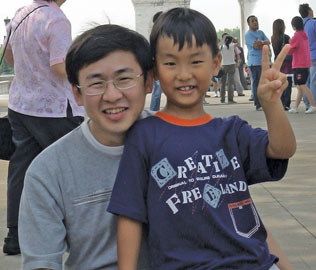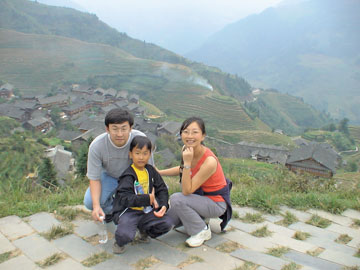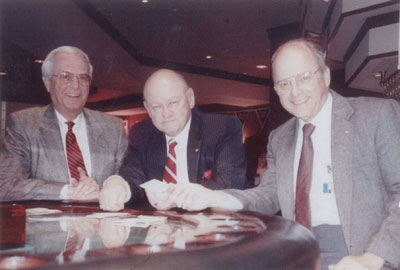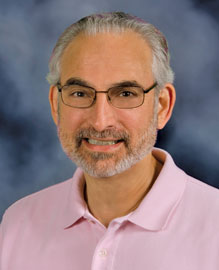Well, summer is over and fall is definitely
here in the North East. The trees are changing color and the
region looks beautiful. I look forward to this time of year
and before long, we will be mentioning the “s”
word, but I don’t want to ruin anyone’s day so
I won’t mention it now.
For those who attended the Awards Luncheon at the 2008 IEEE
International Symposium on EMC, they experienced a difference
from previous years. For the first time, we had “In
Memoriam” posters with photos of members that had recently
passed away. These posters were displayed at the entrance
to the hall where the Awards Luncheon was held. Their names
were also announced during the luncheon and a moment of silence
was observed. As I mentioned in my Spring Newsletter article,
the newly formed Completed Careers Committee planned on recognizing
and honoring these members at the symposium. The “In
Memoriam” posters honored the following: Fred Haber,
Al Smith, John O’Neil, Ken Hall, John Osburn, Mike Hart,
Norm Violette and Hank Knoller.
Since the 2008 Symposium in Detroit, Michigan, two additional
members have passed away; Walt McKerchar and Professor Ban-Leong
Ooi (of the Singapore EMC Chapter). Please take a few moments
and read their biographies below. Both individuals were very
active in the IEEE EMC Society and will be missed by those
who knew them.
In closing, I would like to continue to solicit your support
in sending me the names of members that have recently passed
away. You can either forward them directly to your local Chapter
Chair, or if you don’t know who that is, you can forward
the names to me directly. Page 3 of the Newsletter has the
list of Associate Editors with contact information. |
Dr. Ban-Leong Ooi 1967-2008
Dr. Ooi was born in Taiping, Perak State, Malaysia on 17 Dec 1967.
He received his B. Eng and Ph.D. degrees from the National University
of Singapore (NUS), Singapore, in 1992 and 1997, respectively.
He was an Associate Professor of Electrical and Computer Engineering
at the NUS. He was the past Director for the Centre of RF and
Microwaves. He also served as the deputy director for the MMIC
and Packaging Laboratory and was the Lab Supervisor for the Microwave
Laboratory in the NUS. His main research interests included active
antenna, microwave semiconductor device modeling and characterization,
microwave and millimeter-wave circuits design, and novel electromagnetic
numerical methods. He was the recipient of the 1993 URSI XXIV
General Assembly’s Young Scientist Award. He published over
140 peer-reviewed international journals and conference papers
and participated as either Principal Investigator or Collaborator
of over S$14.5M research grants.
He was a Senior Member of the IEEE, a Member of URSI and a Member
of IET. He served the Singapore IEEE MTT/EMC/AP Chapter as Secretary
(2000-2001) and Vice-Chairman (2002-2003). His last held position
in IEEE was as the Chairman of the Singapore IEEE MTT/AP and EMC
Chapter. He was actively involved in organizing the 1999 Asia
Pacific Microwave Conference, the 2003 Progress in Electromagnetic
Research Symposium, the 2005 International Workshop on Antenna
Theory, the 2006 EMC Zurich Symposium and the 2008 Asia Pacific
EMC Conference.
 |
| Dr. Ban-Leong Ooi is survived by
his eight year old son. |
He also served as an EMC consultant for many private and government
sectors, such as Hitachi Plant Engineering & Construction,
ASCENDAS, Infotel Technologies, Singapore Telecommunications,
Civil Aviation Authority of Singapore, Bovis Land Lease, Trans
Equatorial Engineering and DSO National Laboratories.
Dr. Ooi is survived by his wife, Qiu Youlin, and an 8-year old
son.
The best person to summarize Professor Ooi’s attributes
and accomplishments is Professor Mook-Seng Leong, his closest
collaborator and friend, as well as former final year project,
M. Eng and Ph.D. supervisor.
The following is input from Professor Leong:
I had known Dr. Ban-Leong Ooi since 1987 when I was teaching first
year Physics (Electricity and Magnetism). I immediately noticed
that this student had singular capabilities of reasoning and drive.
He was always asking difficult questions that I did not expect
at that level. He learned for the sake of learning. This enthusiastic
thirst for knowledge was always in him right to 26 August 2008.
We lost our colleague at the most productive age of 41.
I knew him as my undergraduate and postgraduate student who did
an excellent Ph.D. thesis work on distributed amplifiers with
over eight journal publications. The Ph.D. thesis work was very
comprehensive, comprising analysis, simulations, hardware and
experimental characterization. I still refer my students to his
voluminous but excellent thesis.
He possessed a most likeable personality, always with a smiling
face and infectious aura of being open and candid. For his age,
he still looked youthful and ever friendly, traits that others
take for granted that he can be hustled and bullied. Being a nice
person by nature, he would just smile and say “Never mind.
What’s important are my work and interests. Let others criticize.”
I rate him as the most productive member of my Microwave Group.
He volunteered for almost anything and did the job admirably well
because he cared about the task and could be depended on 100%.
He was the staff member behind the sizable sponsorships from external
companies for APMC 1999, PIERS 2003 and APMC 2009. Besides these
three conferences, he was also actively involved in a host of
other reputable international conferences such ISAP, ICCS, etc.
We were supposed to meet on Friday, August 29, to finalize the
exhibition package with the ADIC, and he was the engine who shortlisted
this company and drafted some mutually beneficial agreement terms
for the contract.
 |
| Dr. Ban-Leong Ooi with his wife,
Qiu Youlin, and son on a recent family outing. |
As a consultancy group for EMC, he was a valuable coordinator
who did all the running and planning, though we gave inputs. We
have successfully undertaken over 20 such projects during the
past 15 years, and we (ourselves and the clients) all recognize
his major contributions. His teaching/supervisory performance
was beyond reproach, with students writing comments about his
round-the-clock availability for consultation in particular. His
mastery of the material and its constant upgrading were lauded.
He was the “de facto” computer whiz kid/geek who could
troubleshoot any malfunctioning PC. And he would readily offer
to come to his colleagues’ offices to fix the problems.
Other colleagues can readily vouch for all this. His work rate
was phenomenal, and his efficiency and efficacy were unquestionably
first-rate. We have lost a most valuable staff member, colleague
and friend. He was a most consultative type of person.
He was a lab supervisor/lecturer-in-charge not only in name, but
kept in active interactions with the laboratory staff because
he was a most responsible supervisor who cared for his subordinates.
He had excellent contacts with outside companies. I believe he
also contributed significantly to the various Faculty Committees
and Programs. He was a humble person and never claimed credit
for anything to which he contributed.
His absence will be sorely felt for many years to come. My strongest
personal regret is that I will not see him promoted to Full Professor.
“The presence of a person is never felt until he/she is
gone.”
Mr. Davis would like to thank Professors Mook-Seng Leong and Kye
Yak See for their contributions to this tribute to Ban-Leong Ooi.
Walter McKerchar 1929-2008
Walter D. McKerchar was born in Brooklyn, New York, on September
8, 1929. He enlisted in the Coast Guard at the age of 15 to serve
in WWII. He attended the Massachusetts Institute of Technology
(MIT) and became an electronic engineer, specializing in electromagnetics.
After working for a number of aeronautical companies such as Grumman,
Northrop, and General Dynamics as an EMI engineer, he went to
work for Boeing Aerospace. Walt eventually went into the consulting
business, working for himself, and traveling all over the world
(including China, Taiwan, Korea, Europe, and the USSR). He developed
an expertise in solving EMI problems on certain classified projects
for the State Department in the U.S. and abroad. Another specialty
was large anechoic chambers for EMC testing of aircraft, missile
systems, automobiles and trucks. Examples include the large anechoic
chamber for the Navy at Patuxent River, Maryland, and the large
anechoic chamber for the Ford Motor Company in Detroit, Michigan.
Notable was the project to help the Gostandart (USSR National
Institute of Standards and Technology) develop an EMC test facility
including a large anechoic chamber. This was prior to the breakup
of the USSR and featured many political as well as technical challenges.
Walt was renowned in his field and received many awards.
 |
| Walt McKerchar (center) is shown
at a dB Society gathering with fellow members the late John
Merrell (left) and Jack Moe. |
Walt joined the SAE Committee AE-4 in 1963. At the time, there
were only six members. Under Walt’s leadership, AE-4 grew
to over 100 members. When MIL-STD-461 came up for review, his
committee was responsible for recommending many specification
and test methodology updates, which were later all incorporated.
In 1973, Walt conceived the dB Society. His nick-name (or handle)
was the “Godfather”. He got this handle because they
said he ruled his family with an iron hand. Walt also became the
go-to-man for developing the “handles” of many of
the existing society members, including this Newsletter Editor’s
“handle” of Q T PI. Walt also served on the IEEE EMC
Society Board of Directors for several terms and chaired the Publicity
Committee.
Walt was the Publicity Chairman for the 1987 IEEE International
Symposium on EMC in Seattle and wanted to spice up the Awards
Luncheon which he deemed to be rather dull. He arranged to have
a Saudi Prince as a speaker. His topic was loosely along the lines
“How the Saudi’s were going to spend the money from
the high oil prices due to a shortage in USA, i.e. buy the Empire
State building.” Only the Symposium Chair and Walt knew
that the prince was a Hollywood actor. Many attendees believed
he was a real Prince until the very end when he admitted the charade.
People who attended the 1987 EMC Symposium talked about the luncheon
for many years.
After moving to Poulsbo, Washington, Walt attended clown school
at the University of Minnesota and went on to become a Shrine
Clown. Walt loved entertaining others. It is said that he was
an engineer by vocation, but his avocation was as a “hobo”
clown for the Nile Temple Shrine. His greatest reward was in the
entertaining of children in the hospital and putting smiles on
their faces.
Before his retirement, and for many years afterward, Walt was
a docent at the Maritime Museum in Poulsbo.
Walt McKerchar died on August 12, 2008 and will be missed by many.
He is survived by his wife Kaye, sons Jim and stepson Rick and
daughters June and Kim. Walt had six grandchildren and many great
grandchildren.
Mr. Davis would like to thank Don Weber, Jack Moe and Len Carlson
for their contributions to this tribute to Walt McKerchar.
 Completed
Careers
Completed
Careers